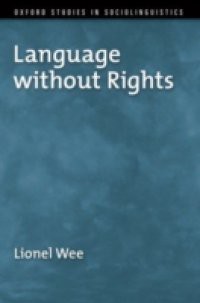Language without Rights is a book-length critique of the concept of language rights. Synthesizing insights from a variety of disciplines, including linguistic anthropology, sociolinguistics, sociology and political philosophy, Wee demonstrates how the appeal to language rights faces a number of conceptual and practical problems, particularly because the discourse of rights is fundamentally inconsistent with the socially variable nature of language. The book also explores an alternative that is more in tune with the complexities of language in social life by suggesting that issues involving language are better managed within a model of deliberative democracy.

